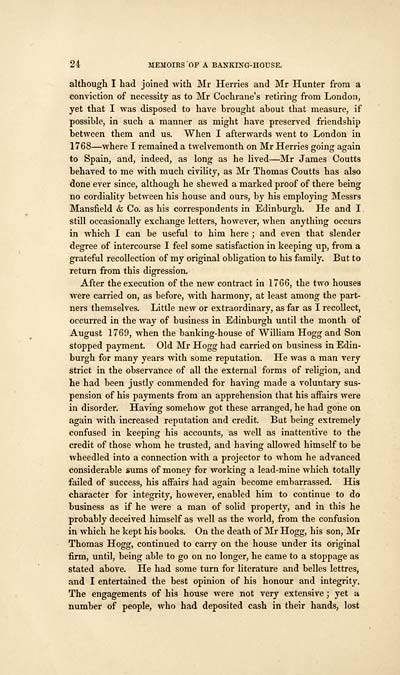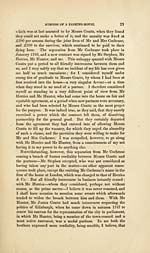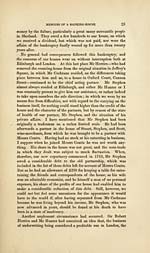Memoirs of a banking-house
(46) Page 24
Download files
Complete book:
Individual page:
Thumbnail gallery: Grid view | List view

24 MEMOIRS OF A BANKING-HOUSE.
although I had joined with Mr Hemes and Mr Hunter from a
conviction of necessity as to Mr Cochrane's retiring from London,
yet that I was disposed to have brought about that measure, if
possible, in such a manner as might have preserved friendship
between them and us. When I afterwards went to London in
1768 — where I remained a twelvemonth on Mr Hemes going again
to Spain, and, indeed, as long as he lived — Mr James Coutts
behaved to me with much civility, as Mr Thomas Coutts has also
done ever since, although he shewed a marked proof of there being
no cordiality between his house and ours, by his employing Messrs
Mansfield & Co. as his correspondents in Edinburgh. He and I
still occasionally exchange letters, however, when anything occurs
in which I can be useful to him here ; and even that slender
degree of intercourse I feel some satisfaction in keeping up, from a
grateful recollection of my original obligation to his family. But to
return from this digression.
After the execution of the new contract in 1766, the two houses
were carried on, as before, with harmony, at least among the part-
ners themselves. Little new or extraordinary, as far as I recollect,
occurred in the way of business in Edinburgh until the month of
August 1769, when the banking-house of William Hogg and Son
stopped payment. Old Mr Hogg had carried on business in Edin-
burgh for many years with some reputation. He was a man very
strict in the observance of all the external forms of religion, and
he had been justly commended for having made a voluntary sus-
pension of his payments from an apprehension that his affairs were
in disorder. Having somehow got these arranged, he had gone on
again with increased reputation and credit. But being extremely
confused in keeping his accounts, as well as inattentive to the
credit of those whom he trusted, and having allowed himself to be
wheedled into a connection with a projector to whom he advanced
considerable sums of money for working a lead-mine which totally
failed of success, his affairs had again become embarrassed. His
character for integrity, however, enabled him to continue to do
business as if he were a man of solid property, and in this he
probably deceived himself as well as the world, from the confusion
in which he kept his books. On the death of Mr Hogg, his son, Mr
Thomas Hogg, continued to carry on the house under its original
firm, until, being able to go on no longer, he came to a stoppage as
stated above. He had some turn for literature and belles lettres,
and I entertained the best opinion of his honour and integrity.
The engagements of his house were not very extensive ; yet a
number of people, who had deposited cash in their hands, lost
although I had joined with Mr Hemes and Mr Hunter from a
conviction of necessity as to Mr Cochrane's retiring from London,
yet that I was disposed to have brought about that measure, if
possible, in such a manner as might have preserved friendship
between them and us. When I afterwards went to London in
1768 — where I remained a twelvemonth on Mr Hemes going again
to Spain, and, indeed, as long as he lived — Mr James Coutts
behaved to me with much civility, as Mr Thomas Coutts has also
done ever since, although he shewed a marked proof of there being
no cordiality between his house and ours, by his employing Messrs
Mansfield & Co. as his correspondents in Edinburgh. He and I
still occasionally exchange letters, however, when anything occurs
in which I can be useful to him here ; and even that slender
degree of intercourse I feel some satisfaction in keeping up, from a
grateful recollection of my original obligation to his family. But to
return from this digression.
After the execution of the new contract in 1766, the two houses
were carried on, as before, with harmony, at least among the part-
ners themselves. Little new or extraordinary, as far as I recollect,
occurred in the way of business in Edinburgh until the month of
August 1769, when the banking-house of William Hogg and Son
stopped payment. Old Mr Hogg had carried on business in Edin-
burgh for many years with some reputation. He was a man very
strict in the observance of all the external forms of religion, and
he had been justly commended for having made a voluntary sus-
pension of his payments from an apprehension that his affairs were
in disorder. Having somehow got these arranged, he had gone on
again with increased reputation and credit. But being extremely
confused in keeping his accounts, as well as inattentive to the
credit of those whom he trusted, and having allowed himself to be
wheedled into a connection with a projector to whom he advanced
considerable sums of money for working a lead-mine which totally
failed of success, his affairs had again become embarrassed. His
character for integrity, however, enabled him to continue to do
business as if he were a man of solid property, and in this he
probably deceived himself as well as the world, from the confusion
in which he kept his books. On the death of Mr Hogg, his son, Mr
Thomas Hogg, continued to carry on the house under its original
firm, until, being able to go on no longer, he came to a stoppage as
stated above. He had some turn for literature and belles lettres,
and I entertained the best opinion of his honour and integrity.
The engagements of his house were not very extensive ; yet a
number of people, who had deposited cash in their hands, lost
Set display mode to:
![]() Universal Viewer |
Universal Viewer | ![]() Mirador |
Large image | Transcription
Mirador |
Large image | Transcription
Images and transcriptions on this page, including medium image downloads, may be used under the Creative Commons Attribution 4.0 International Licence unless otherwise stated. ![]()
| Histories of Scottish families > Memoirs of a banking-house > (46) Page 24 |
|---|
| Permanent URL | https://digital.nls.uk/95087466 |
|---|
| Description | A selection of almost 400 printed items relating to the history of Scottish families, mostly dating from the 19th and early 20th centuries. Includes memoirs, genealogies and clan histories, with a few produced by emigrant families. The earliest family history goes back to AD 916. |
|---|

